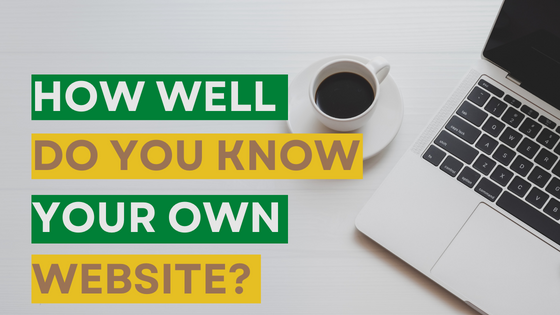How well do you know your own website?
Caller: “Hi, I’d like some information on product Z”
Business owner: “Ah yes, of course, what would you like to know?”
Caller: “I need the exact dimensions and specifications of product Z”
Business owner: “Yes, that’s all on our website”
Caller: “Could you direct me to where I can find it please?”
Business owner: “Err...”
The importance of knowing your own web content
I’m in the early stages of refreshing my own website, which is a huge and important exercise to support growth and get my business fit for the future. When planning a new website it’s often hard to know where to start. But you have to start somewhere. And what better place to begin than with content.
I’m reviewing what’s on my website so I can create a plan of what needs updating, what content I’d like to add, and which blogs I am going to move across to the new site.
So far, I’ve discovered a few broken links and a series of blogs I’d forgotten about. The blog posts are interviews with key personal contacts about the importance of quality content. Two out of the four people have moved on from their businesses. That tells me I either need to ditch the content or re-purpose it and bring it up to date.
So what about your own website content?
If you run your own business it’s your job to know your website inside out. Even if someone else manages your website for you, it’s vital to know what’s on there so you know what messages you’re communicating and you can point customers to useful resources.
In fact, if there’s a team member or a third party overseeing your website, I’d suggest it’s even more essential to keep a track of content. You need to know what messages are being shared and what kind of impression they are making with your audience.
How to do a website content audit
A website content audit isn’t difficult to do. All you have to do is step into a user’s shoes, set your self a few tasks, and browse your website as a potential (or existing) customer.
Read the copy - Does it flow? Do it make sense? Is it current?
Click on buttons and links - Do they work? Do they take you to the place you expected?
Fill out forms - Book an event, subscribe to your newsletter, buy from your online store. What happens? How easy is each task?
Use the search function to find specific information - Is it user friendly? Can you find what you’re looking for?
You can learn a lot from experiencing your website as a customer. Following a typical user journey is enlightening and will help keep your website relevant and valuable.
A content audit will weed out:
Out-of-date content e.g. team members who have left
Broken links
Data points that need to be refreshed with the latest stats
Clunky, difficult to use sign-up forms
Broken automation, e.g. subscription emails that don’t arrive
Old price lists that may mislead customers
Identify website content gaps
A website audit will highlight missing content. This could be a case study from a sector you love working in, a new service you aren’t promoting, or a reminder to add that golden nugget of a testimonial you’ve been meaning to upload for months.
Your audit experience might also lead to some interesting thoughts on how to improve that all-important user journey. Think back to the telephone conversation at the start. If you make it easy for that customer to find a product specification first time, they don’t need to call up and ask.
Be sure to jot down your ideas as you go, and, if you need any help filling those content gaps, contact me to book a chat.
Do a mini website content audit today
Take 15 minutes out of your busy schedule and spend some time browsing your company website. If you have a small site, it might not even take you that long to review.
Getting to know your website content is well worth the time investment. I guarantee it will throw up interesting findings, generate quick fixes and inspirational ideas. Above all, you’ll feel more confident directing customer queries knowing that the messaging is on-point, all links are working, and your copy is accurate and up-to-date.
